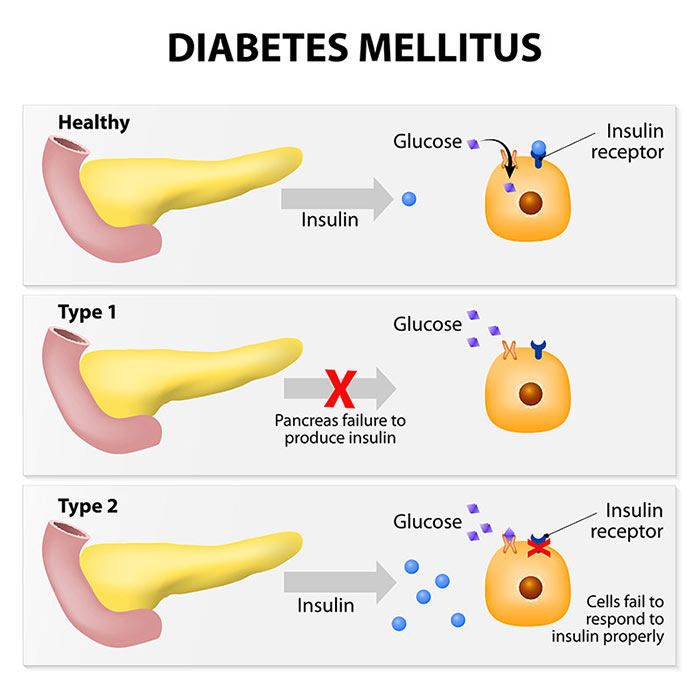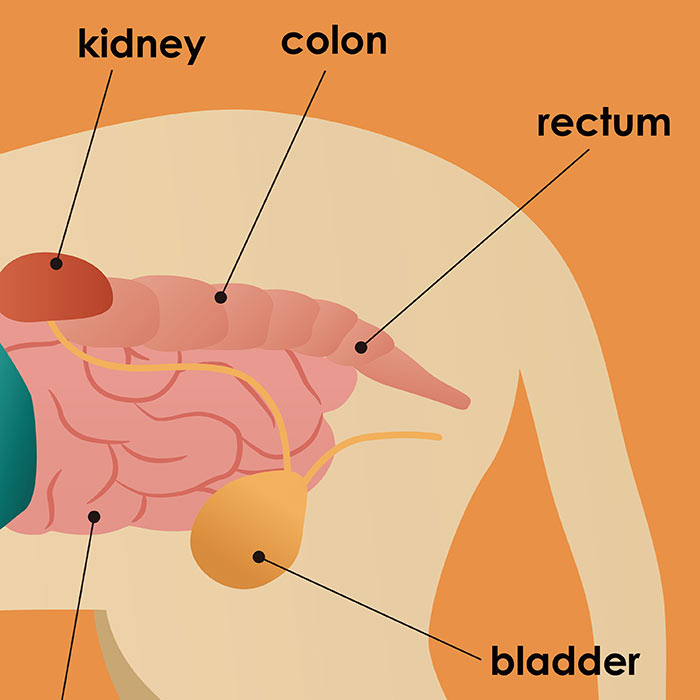Pancreatitis in dogs
Pancreatitis in dogs or canine pancreatitis is the inflammation of the pancreas. The pancreas is an organ that lies alongside the stomach. It is an important part of the digestive system as it produces the enzymes needed to digest food properly. It also produces hormones such as insulin, which regulates blood sugar. When the pancreas becomes inflamed, the flow of enzymes is disrupted and they spill into the abdominal cavity.
Pancreatitis can be a mild to serious condition. In serious cases, the enzymes that are redirected away from the digestive tract and into the abdomen begin to break down the fat and proteins in the dog’s essential organs. In this case, the misplaced enzymes are causing the body to digest itself.
The organs that are usually affected first are the kidneys and liver, because of their close proximity to the pancreas. Although pancreatitis is a serious condition if left untreated, it can usually be treated without any permanent injury to the animal’s organs. If left untreated for an extended period of time, however, severe organ damage can occur, followed by brain damage, shock and possibly death.
The causes of pancreatitis vary and can include changes in diet or an allergic reaction to a prescribed medication. The condition can affect all breeds of dogs and cats, however there are a number of breeds that seem to be more susceptible to developing the condition.
There is currently no cure for the condition. Veterinarians will usually admit the affected animal to hospital in order to address any infections, dehydration and trauma caused by pancreatitis. Here, under observation, the pancreas is allowed to heal on its own.

Symptoms of pancreatitis in dogs
Pancreatitis can lead to a number of serious symptoms, depending on the severity of the condition. The symptoms of pancreatitis are not unique to this condition and the illness can often go overlooked or be misdiagnosed, allowing the condition to become more severe. In the later stages of pancreatitis, symptoms will be more serious. Fortunately, if these symptoms are identified early and veterinary care is sought immediately, pancreatitis will usually not cause permanent damage.
Among the more common symptoms are a sore or swollen abdomen, nausea, vomiting, fever, lethargy, abdominal pain, diarrhoea and decreased appetite. If you notice any or all of these symptoms, see your vet for immediate assistance.
- Loss of appetite – If your dog isn’t showing the usual enthusiasm for their food this is a sure sign they’re not well. While a loss of appetite can suggest a number of possible illnesses, this is often associated with more serious conditions.
- Difficulty Breathing – If your dog’s pancreatitis becomes advanced, then a number of important organs can become inflamed and will cause the animal a great deal of pain and fatigue. An intolerance to exercise, depression and severe breathing difficulties are all signs of serious illness.
- Abdominal pain – Tenderness around the belly is another sign of pancreatitis. If you hear groans or a whimper whilst gently pushing against your dog’s abdomen, it’s time to see the vet.
- Severe diarrhoea and vomiting – This can lead to dehydration if not carefully managed. If your dog has had soft or watery stool for more than a week, it could be a sign of a more serious illness.
- Dogs will vomit from time to time for a number of reasons. However, if you’re noticing that your dog is vomiting or retching more often than normal, pancreatitis could be the cause.

Diagnosis of pancreatitis in dogs
Your vet will conduct a number of tests to first determine if your dog is indeed ill and whether or not they are suffering from any other conditions. Because the symptoms for pancreatitis are common to a number of other mild and more serious conditions, a thorough physical exam and blood tests will usually be carried out.
Your vet will ask about your dog’s health history and will likely question you about the dog’s environment, their diet, as well as the level and type of exercise they obtain. For example, if your dog has recently enjoyed a particularly fatty diet, then this could point to pancreatitis.
A complete blood count is taken as well as a chemistry panel and urine test. These tests usually reveal and elevated white blood cell count, but this might be caused by a number of diseases other than pancreatitis. The blood levels of pancreatic enzymes may also be elevated; while this is very helpful in diagnosing pancreatitis, some dogs with the condition will show normal levels of these enzymes.
Another way to diagnose pancreatitis in dogs is to perform the canine pancreatic lipase immunoreactivity test. The test is designed to pick up any signs of an increased level of the pancreatic lipase.
Further diagnosis tools include x-rays and ultrasounds. Also, a simple biopsy will produce a conclusive result, however they are not often performed.
Although these tests will help the veterinarian determine whether you dog does indeed have pancreatitis, oftentimes diagnosis is made by performing a simple but thorough physical examination, clinical signs and medical history.
Treatment of pancreatitis in dogs
There is no cure as such for pancreatitis, but the condition can be managed successfully if there is early diagnosis and prompt treatment. Therapy may be required for a number of problems within the animal’s body, including severe infection, dehydration, malnutrition and pain.
In the case of mild pancreatitis, treatment will be supportive, by resting the pancreas and allowing it to heal itself. Food may be withheld for a few days if necessary, especially if the patient has been vomiting. During recovery, a special low fat, highly digestible diet will be given.
If your dog is diagnosed with more severe pancreatitis, he will most likely be admitted to hospital for close observation and advanced care. It’s likely that he will stay for around two to four days, although in some cases it can be much longer.
The aim of hospitalisation is to make the affected animal feel comfortable and stress-free while treatments for infections and malnourishment can be properly administered. The following treatments may be given, depending on the severity of the condition:
- Analgesics to control pain
- Intravenous fluids to maintain normal fluid and electrolyte balance
- Anti-inflammatory drugs
- Medications to control vomiting or diarrhoea
- Antibiotics if concurrent infection is suspected
- Intensive care using aggressive doses of intravenous fluids and medications to counteract systemic shock.
Once any inflammation to the pancreas and surrounding organs is addressed, the pancreas will usually heal itself after a number of days to weeks. Surgery is rare in the case of pancreatitis but associated conditions that may require surgery include bile duct obstruction, inflammation of the abdominal cavity and pancreatic abscess.
In most cases, pancreatitis is a mild condition and the dog is likely to make a full recovery. Once the animal has spent a few days in hospital under observation, it’s likely that he will be returned to you without any serious lasting effects.
However, if the condition isn’t diagnosed early and it becomes severe, treatment options are more limited. Pancreatitis can cause the surrounding organs to become inflamed and can even affect the brain.
Prevention of pancreatitis in dogs
Although it’s not entirely clear what causes the onset of pancreatitis in dogs and cats, vets believe that fatty diets and over feeding have some role to play.
In order to prevent the onset of pancreatitis, vets suggest that obese dogs be put on a strict diet that excludes unnecessary fatty components and treats. It’s also recommended that dogs are fed twice a day rather than one big meal at one time. It’s best to not feed dogs immediately before they are likely to go to sleep. A high level of carbohydrates in the diet is also a concern and should be monitored closely.
Outside of a healthy diet and exercise regime, it’s thought that some of the causes are simply genetic and cannot be avoided. The best way to prevent your dog from developing pancreatitis is to have them checked by the vet regularly.
Commonly affected breeds
While the condition can affect all breeds of dogs and cats, there are a number of breeds that appear to be more susceptible to developing the condition. One of the most common breeds to develop pancreatitis is the Schnauzer.
Pancreatitis commonly affects middle-aged to older, female dogs.
Obese dogs and those that don’t get much exercise are also at greater risk.
Interesting facts!
- The disease is fast moving and can begin to seriously affect your animal’s health within a couple of days.
- It’s not only diet and genetics that are thought to bring about pancreatitis. The condition can develop because of other conditions and illnesses that animal may have. Diabetes and hypothyroidism both alter the metabolism of the body, leading to a higher risk of developing the condition.
- Pancreatic enzymes themselves are not normally harmful to the dog’s body. It’s when the pancreas becomes inflamed and the enzymes are released too early, that they enter the animal’s abdomen and begin to break down the fat and proteins in the other organs.
- If a significant number of cells that produce digestive enzymes are destroyed, a lack of proper food digestion may result. This is known as exocrine pancreatic insufficiency (EPI).
- If a significant number of cells that produce insulin are destroyed, diabetes mellitus can result.
Bow Wow Meow Pet Insurance can help protect you and your dog should an unexpected trip to the vet occur.
-
Find out more about our dog insurance options
-
Get an online pet insurance quote










